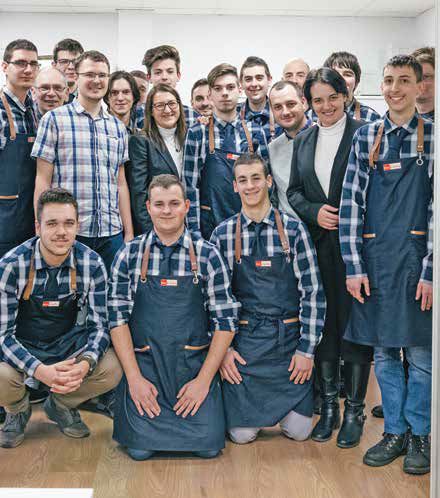Klett DUAL opened the door to its school and on that occasion, held a special event called ‘Breakfast with Mechatronics Professionals’ on February 27th at the Chamber of Commerce and Industry of Serbia

The event was opened by Mirjana Kovačević, head of the Centre for Education and Dual Education and Director of the Business Academy of the Chamber of Commerce and Industry of Serbia, Gabrijela Grujić, Assistant Minister of Education, Science and Technological Development, and the representatives of the Klett DUAL School – Ferdinand Ayen, CEO Stuttgart, and Jelena Jakovljević, Director of Ernst Klett Präsenzlernen Osteuropa GmbH – Belgrade Branch (Klett DUAL School). During the event, the guests were able to hear more information about the experiences and advantages of dual education, as well as about the accredited mechatronics curriculum taught at the Klett DUAL School. We would especially like to single out the professional segment of the event, during which the lecturers and the first generation of students, of whom we are particularly proud, presented the potential for automation of technical systems and the results of the Ready for Industry 4.0 training.
ABOUT KLETT DUAL SCHOOL AND ITS CURRICULUM
The Klett DUAL School for Vocational and Dual Adult Education teaches curriculum tailor-made to companies. The Klett DUAL School’s target group is high school graudates, age 18 and over. Students can be unemployed persons, but also those who have a job but need professional training. The development of the curriculum is based on identified needs, or rather identified know-how and skills that employees in companies lack. The dual education and training programme at the Klett DUAL School is adapted to the market and specific employers, since the content of the work practice is defined based on the input from companies. The company in which the work practice will take place is the only one that can inform of the devices and machines it uses, which is directly reflected on students’ results in learning.
The dual approach in the implementation of the school’s programme entails a combination of theoretical lectures with exercises at the school and practice in companies, which has been tried and tested during the long German tradition. Programmes are accredited by the Ministry of Education, Science and Technological Development, and additional licenses have been provided for the translation and publication of German textbooks on the topic of mechatronics, which will be used by our students. The equipment and software used in teaching is of high quality and the latest generation. Considering that, after the conducted research of companies’ needs, it was ascertained that our production companies, especially in the industry, need mechatronics the most, the Klett DUAL School is starting its operations by teaching mechatronics. We offer three programmes:
• The Alphabet of Mechatronics lasts 98 hours and is taught 100% at the school,
• Maintenance of Mechatronic Systems lasts 498 hours and 47% of it is taught at the school, 53% in a company
• Higher Mechatronics Technician lasts 2,784 hours and 46% of it is taught at the school and 54% in a company
For more information, please go to Klett DUAL School’s official website – www.klett-edu.rs
The knowledge of mechatronics is required in the automotive industry, machinery and plant production, electrical industry, food processing, etc. Mechatronics workers are mechanics, electronics professionals and advanced IT experts, all rolled into one person, who are able to assemble, dismantle and maintain mechatronic machines, plants and systems in any production segment.
FIRST TRAINING SESSION – READY FOR INDUSTRY 4.0 – HELD AT KLETT DUAL SCHOOL
The first training session, Ready for Industry 4.0 was held from February 11th to 22nd, 2019, at the Klett DUAL School and was aimed at senior students of technical high schools. By using the approach based on active learning and problem solving, the students had the opportunity to upgrade the didactic mechatronic equipment designed to simulate the production line of Industry 3.0 to reflect Industry 4.0. Throughout eight learning situations, the students constructed their own knowledge by drawing conclusions from concrete work activities about what they should do and in which way, or rather, they abstracted reality by themselves.